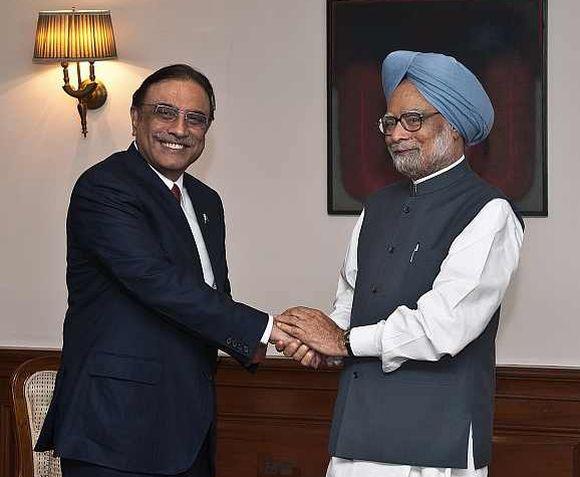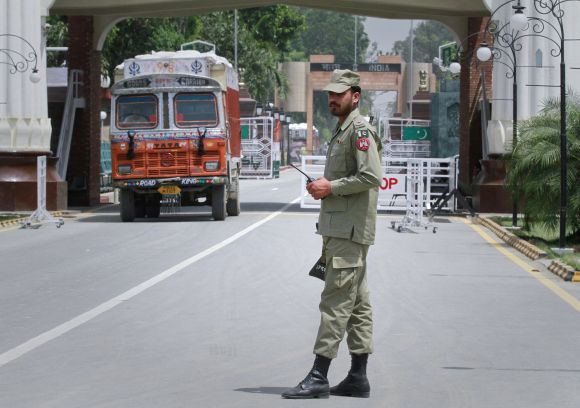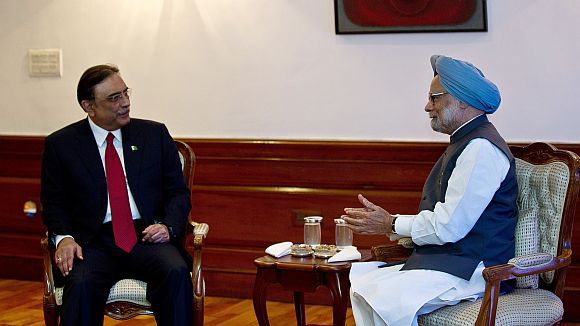 | « Back to article | Print this article |
Why Kashmir, terror shouldn't obstruct Indo-Pak ties
What we face is an Indian public mindset influenced by the terrorism issue that is as rigid as the Pakistani army mindset influenced by the Kashmir question, says B Raman
Understandable caution was the keynote of the talks between Prime Minister Manmohan Singh and Pakistan President Asif Ali Zardari at New Delhi on Sunday.
At the invitation of our prime minister, Zardari had stopped over briefly in New Delhi for talks followed by lunch with Dr Manmohan Singh while on his way to Ajmer Sharif for prayers.
As a Sindhi, Zardari will have difficulty in ensuring that any initiative that he might take for better relations with India will have the endorsement of the Punjabi-dominated Pakistan army.
While Zardari has been able to consolidate his position as the president and fend off possible challenges from the army to the Pakistan People's Party led-government, he cannot yet be confident that the army will totally back any initiative that he might take for a qualitative improvement in Pakistan's relations with India.
Please click NEXT to read further...
Click here for more Realtime News on Indo-Pak ties!
Rigid mindsets holding Indo-Pak ties hostage
In India's point of view, a qualitative improvement in the bilateral relations will be possible only if Pakistan gives up its policy of using terrorism as a weapon against India for its strategic objective of changing the status quo in Jammu and Kashmir and takes action against the Lashkar-e-Tayiba for its involvement in the 26/11 terrorist strikes in Mumbai.
Since the policy of using terrorism and the LeT against India was initiated by the Pakistan army and the terror group acts under the sponsorship of the Inter-Services Intelligence, Zardari, despite all his goodwill for India, will not be in a position to satisfy the Indian demands on the terrorism issue.
Manmohan Singh has been equally cautious because he realises that he will not be able to sell any agreement to the Indian public opinion unless Pakistan gives satisfaction to India on the question of terrorism. Any toning down of past Indian demands on terrorism will not be acceptable to Indian public opinion.
Thus, what we face is an Indian public mindset influenced by the terrorism issue that is as rigid as the Pakistani army mindset influenced by the Kashmir question.
The two rigid mindsets will make it difficult for the two leaders to find a workable way forward despite whatever determination they may have to find a solution to the traditional issues of contention.
Indo-Pak trade must grow despite unresolved issues
Any exercise to find a solution to the two substantive issues between the two countries -- Kashmir and terrorism -- is bound to hit barriers that will hinder forward movement. That is why the suggestions are made from time to time to focus on other issues which will promote goodwill even while trying for ways of solving these difficult issues.
Trade is one such issue. We have successfully used trade as a confidence- and goodwill-building measure between India and China. Despite the lack of progress in finding a solution to our border dispute with China, we have succeeded in creating a steadily expanding comfort level between the two countries by focusing on trade and other contacts even while trying for a border solution.
It is gratifying that Pakistan, which was resistant to the idea of delinking trade from the Kashmir issue, is now inclined not to make trade a hostage to the Kashmir issue.
We have to think of other ways too of building goodwill and creating a greater comfort level that could ultimately facilitate a solution to the substantive issues.
The present lack of the necessary goodwill and comfort level between India and Pakistan is due to the paucity of contacts at various levels -- people to people, political leaders to political leaders, members of Parliament to MPs, army to army, police to police, etc. Such contacts at the personal and institutional levels will go a long way in removing misperceptions and suspicions and creating a benign mindset shorn of the traditional rigidities.
Why PM Singh must visit Pakistan
Bilateral exchanges of visits with the objective not of finding a solution to the disputes in one go, but of creating greater goodwill and comfort level will go a long way in creating the necessary willingness to look for constructive ways of finding a solution to issues such as Kashmir and Pakistani sponsorship of terrorism.
It is keeping that in view that I have been advocating for over a year now a goodwill visit by our prime minister to Pakistan -- even if it be for a few hours only -- without any prematurely ambitious objective of solving the differences over Kashmir and terrorism. It is for the same reason that I have been a strong advocate of other networks of contacts -- particularly military to military.
The visit of Zardari was neither a success nor a failure if we look at it from the point of view of finding a solution to the contentious issues. The two leaders have been over-cautious in their approaches and reiterated at least in public the traditional stands on various issues.
Despite the continuing rigidities, the visit has contributed to a little more relaxed perception of each other. It is important to build up on this. For this purpose, I reiterate my past suggestion for an informal visit by the prime minister to Islamabad without linking it to any solution to any of the contentious issues.
I notice that political and public opinion in India has not reacted negatively to the initiative taken by the prime minister for converting a pilgrimage by the Pakistani president into a soft political visit too.
It is gratifying that there are no indications of any negative reaction from the Pakistan army too to this exercise in creating goodwill and mutual comfort.
We should not allow this benign mood in the two countries to dissipate due to continuing over-caution. Let the prime minister go to Pakistan as quickly as he can to build up on this mood without setting for himself any difficult and presently unachievable objective.
At the same time, I would urge the prime minister once again to give serious thought to the question of initiating military to military contacts between the two countries.




